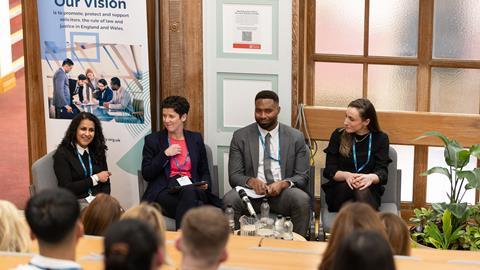In December, the Law Society’s Women Solicitors Network Committee hosted the newly named Carrie Morrison Lecture at the University of Chester Law School, bringing this annual lecture event focusing on gender equality within the legal sector to the regions for the first time. Building on our 100 Years of Women Solicitors celebrations in 2022, this was an opportunity to reflect on past achievements but more importantly to look forward to the next hundred years. A thought-provoking keynote was provided by Victoria Evans (Level Law) ably supported by a panel of sector representatives; Deyontae James (rradar Law) and Carla Bennett (UNISON).


The lecture sought to celebrate progress but also challenge the sector to address embedded issues that continue to impact gender equality. Both the Law Society’s Diversity and Inclusion Framework and the Women in Law Pledge (introduced in 2019) have made significant strides in assisting the sector to recognise and address gender and broader inequalities. Women now consistently outnumber men at admissions level and early career stages, there is greater transparency in pay and considerable progress around flexible/hybrid working as a result of the pandemic. However, systemic issues remain that continue to hamper progress towards gender equality demonstrated by the continuing gender disparity in the seniority representation pipeline, gender segregation across legal disciplines, a gender pay gap which is far wider than comparable professions and a worrying slip backwards in terms of opportunities for remote working in recent years.
Three key themes emerged from the keynote lecture and panel discussion that employers in the legal sector must acknowledge and take steps to address, to make true progress around gender equality.
Action on retention
Organisations must take intentional action towards addressing retention of women in law. The most recent Law Society data in relation to practising certificate holders demonstrates a stark difference between women and men; the numbers of women holding practising certificates aged 45 and under stands at over 55,000 but falls sharply to around 25,000 for those over 45. For men, the numbers of practising certificates holders numbers remain consistent at around 36,000 either side of 45. So, it is clear that women are entering the legal profession in strong numbers but are not staying practising within it. Organisations need to understand their own barriers to retention and take tangible, intentional steps to addressing attrition.
Recognise the value unlocked by flexibility
While building organisational culture and strong bonds between colleagues is key to business performance, these can be achieved in several ways and there are significant organisational benefits to embracing flexible work. Flexible work is an umbrella term that covers different working arrangements around where, when, and how people work; it can look like job shares, remote work, hybrid work, part time, compressed hours, annualised hours, or term time contracts which are just an example. Flexible work allows colleagues to ensure they can make their working schedules work for them, whether or not they have caring (or other) responsibilities or are disabled. Victoria Evans, keynote speaker and partner at Level Law, was able to embrace flexible working in order to train for a sporting challenge that saw her break a World Record for the fastest woman to row solo across the Atlantic in 2022! Flexible working allows legal employers access to wider talent pools and to retaining that top talent, with employees reporting higher levels of motivation and engagement in their work, driving their commitment and loyalty. Organisations need to strike the right balance when it comes to the value of connecting in person and the value of flexible work.
Normalising caring responsibilities for men
It is still the case that for working families in the UK, women are eight times more likely to take the primary role in caring for children. Encouraging and supporting male partners in taking on more caring responsibilities is an accelerant to keeping women in, and advancing along, the talent pipeline and on the pathway to seniority. Yet research from the Fawcett Society finds that fathers are twice as likely as mothers to have requests for flexible working turned down, and a report by the Women and Equalities Committee found that some men have been mocked by colleagues after opting to work part time to share childcare duties. These embedded stereotypes and biases often deter men from even broaching the subject with their employers. Organisational culture is shaped by the day-to-day behaviours of colleagues who work there. So, environments in which non-inclusive behaviours and/or language are accepted or left unaddressed will foster a culture of exclusion hampering progress towards equality.
Gender equality progress in the legal sector should be celebrated and the days when women were not permitted to wear trousers and faced normalised overt discrimination are thankfully mostly long gone. However, the lecture illuminated measures to ensure further progress and in particular, the need to develop measures to retain talented women, promote focus on the benefits of flexible working and the impact of men as allies in promoting equality for women in the profession.
Initiatives like the Carrie Morrison Lecture and the Women in Law Pledge are there to drive the gender equality agenda further forward, providing the opportunity for the legal sector recognise challenges and to share and develop good practice in a way which moves beyond rhetoric and aspiration into action and impact. As Baroness Hale once said we must ‘… look forward to the day when we don’t even have to have this conversation.’
Chantal Davies is co-vice chair of Women Solicitors Network committee and professor of law, equality and diversity, director forum for research into equality and diversity, School of Law, University of Chester. Neha Lugg is a Women Solicitors Network committee member and senior legal trainer at Lewis Silkin































